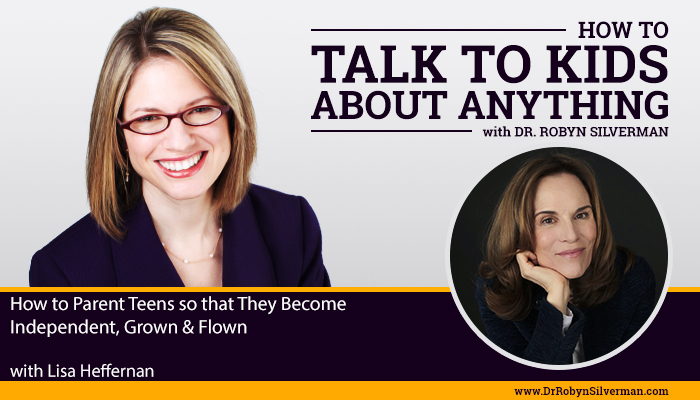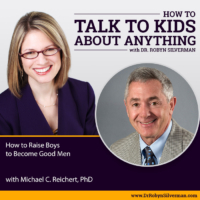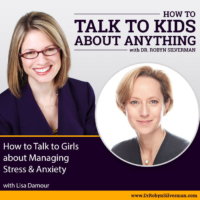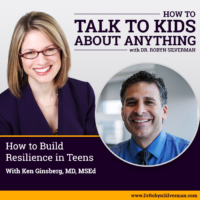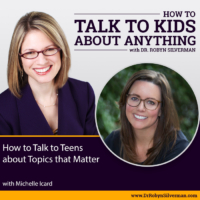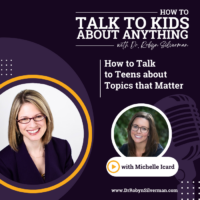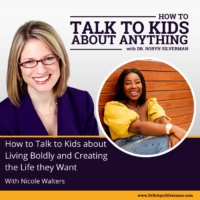Podcast: Play in new window | Download
Subscribe: Apple Podcasts | RSS | More
How to Parent Teens to Become Young Adults Who Have Grown & Flown
This podcast will focus on raising independent teens so that they can become young adults who can take care of themselves and make good, wise choices on their own. What skills do they need? What must they learn? Dr. Robyn Silverman interviews Lisa Heffernan from Grown and Flown on the How to Talk to Kids about Anything podcast.
Intro
The high school and college years are an extended roller coaster of ups and downs as our kids try to figure out academics, friends, first loves, first break-ups, driver’s ed, jobs, and leaving the comforts and predictability of home. As children move through their teen years, they are constantly changing—their brains, their bodies, their interests so how we parent them must change, too. But how do we stay close as a family and support our kids in their new adventures while still leaving room for them to discover who they are on their own? For this discussion, I will be talking with Lisa Heffernan
BIO
Lisa Heffernan is the co-founder of Grown and Flown, the #1 site and community for parents of teens and college students, reaching millions of readers every month. With more than 700 writers, they publish original content on a daily basis and cover topics such as college admissions, mental health, and parenting. You can join Grown & Flown on Facebook, sign up for their newsletter, and read their book, Grown & Flown: How to Support Your Teen, Stay Close as a Family, and Raise Independent Adults.
Important Messages:
- Don’t concentrate on teaching kids the skills they can learn on YouTube. When they leave your home and they don’t know how to do something- they’ll go to Youtube or will call you! The conversations they can’t have without you or are harder to find on Youtube are the ones you should have before they leave home.
- Self care, sleep, eating right- have them before they leave. How will you take care of your body and mind when they leave home? When the structure of our family is not there.
- Learning opportunities- in middle school. When you are by yourself, you are the one who is making the choices for yourself. You need to be able to ask; “is this the right move for me?” Still in middle school- so under my roof- so ongoing conversation. Or, for kids when aren’t creative if they need that outlet, they don’t feel well.
- Teaching self- practice- tools- when under the roof.
- Make it NOT a lecture. Stop lecturing and start asking. “To me, you are not seeming as happy right now- what’s different in your life right now?” Let them answer rather than you. Socratic. Ask the questions that lead them there.
- Teaching them—modeling- a line of questioning. You used to talk out loud. Shifts- this is how I think about this. Modeling how you think. (Parenting out loud). Take your voice with them! Model how to THINK.
- Model what to DO- Transition- organization is tough! Through middle school years- help them with organizational structure. Show them how to organize your time. Look at my calendar so you can see how I do it. Time management. Show them your schedule so they can see preplanning and prioritizing. When the scaffolding is removed, they can fold. Working with them- what tools would work for you?
- Show your kids when you mess up. Teaching moment. I didn’t plan this well. Now I’m in trouble with time. Deliberate planning- make mistakes. Put a buffer in! Temptation is to blame traffic. “I didn’t take the traffic into account.” Point the finger at yourself. Traffic becomes the scapegoat.
- Technology: Latest tech to track their child. On the one hand, safety arguments. Map app. Remedy situation. Argument about trust and doubts. Slippery slope. Where we need to draw the line? Where does tracking begin and end? (This, and portal for grades. Monitoring). Principal. Figure out where you want to be in 12th grade and work backwards. Curfew- if you want it to be midnight in 12th, don’t start with it being 11:30 in middle school. Left no room.
- If goal is to stop tracking kids in 12th– then how are you going to get there? Some track their parents! Where do you want to be? No longer track in 12th. Some value to track when learning to drive. Inexperienced driver speeding. Place where want to get to “We are not saving them or tracking them, they are on their own” is goal, backtrack. So in 11th, only tracking when they go to a party late at night. I’ll track you just for [these hours]. Different families, different rules.
- Allow children to take ownership.
- Might have to amend your choices if there is a problem. (Parent portal). Every child is not the same. Figure out all sides of the argument.
- What are your goals for school? We are going to start the school year- will start portal checking once per week. Then, every other, then, once per month. Then not check unless there is a problem. They control how much parent involvement based on adhering to their goals and doing what they have set out to do. Goals- encourages independence. Agreement- if you do X, then I’ll do Y. If you fulfill everything, I’ll check less. Then not at all. Sometimes consequences and some stumbles are enough- instead of full blown failure.
- What works for your child? Write assignments on a white board. Planner. Develop a system.
- Capable, self-reliant. In many areas. Don’t want to over-parent. How can we address? Without deserting them. Their childhoods are so different. Electronic tether. We much closer to our teen and young adult children than we are with our parents. We can’t give them independence in the same way as we did. We might have had it when we walked to a friend’s house a mile away. Some people don’t feel comfortable with that anymore. Run a few errands for us?
- Some electronics can help us give more freedom! We might be tracking but we aren’t with them.
- Going abroad- enhanced our lives. Our kids can do it now in even in a safer way than us. What did we get out of those experiences? How can they get a similar experience? Don’t want to keep tracking. Can get overboard. Keep in touch but not overboard. Transitions can be tough. Let them set the pace. Doesn’t need to be a phone call. Can we a quick text, a photo. Less significant way- relaxed banter- more often but not so much time.
- Stress and anxiety. What to do? Like think of a happy place. Ways for them to manage their own stress. Hard to teach a stressed out 18 year old how to climb down from a stressful situation. Easier to do it in person!
- Help kids learn what works best for them. Exercise? Bath? Talk to a friend over coffee? Listen to music? Video games?
- Why are you feeling stressed? Talk about organization. Priorities.
- Stress is not a bad thing. It’s an indicator. A red flag. Instead of needing to get rid of the stress, look at stress as an indicator of the problem so that you can look at it and get rid of the root cause. Don’t just treat the symptom. With stress- want to find out what is causing it and then treat it. How to do both things.
- Mistake- you shouldn’t have to do all of this work. Too stressful. It’s not like when we were younger. This is not helpful. That world is gone. It’s here to stay. How do you deal with the world today? They can’t live in our teenage years—they have to live in theirs.
- Drugs and alcohol: (1) Give kids the credit that is due. “You are a smart person and you are going to understand it when I explain to you some of what we now understand about these things.” Articles, science around this. (See podcast with Jess Lahey on Addiction Inoculation). (2) Impact is greater for teens than adults. Long term effects are greater. Risks of addiction are greater the earlier you start. Kids are smart enough to understand this. Know through science. (3) Give them things to read. Wealth of info. Act like a young adult- treat them that way. (4) Yes you will get consequences. You should call me- we will keep people safe. It can’t be me just forbidding it though. This won’t work. Bring them into science and what we know.
- Sex, sexuality: When you are with your tween/teen- scary. Remind yourself- long conversation that happens over many years. First 5 conversations is for comfort. Talk with a 5 year old with 5 year old things. !0 year old with 10 year old things. 17 year old with 17 year old things.
- Talk about their own agency. Nobody should ever do anything that isn’t 100% in their comfort level. No is always an option for both people at any point. Used to get message that boys were the aggressors and girls were the regulators. There are consequences of pregnancy. But damage that is mental- is true for both genders. Hand holding to sex- consent can be given or taken away at any time. Can start young with consent- tickling, hug- so when we do get to talking about a 9 year old- not coming out of left field. Can build on the conversations over time.
- Drugs/sex- keep conversation open. Don’t bring in antiquated thoughts. We might be heterosexual- stilted conversation will stop the conversation. “You might feel this today, you might feel differently 6 months from now, years from now, you can always come to me. You are evolving- your thinking is evolving, you are not in concrete- you can always change how you are feeling. Don’t say “but you said this…” They can change. Ebb and flow with more information. Listen to their gut.
- Way we go off track. We know a lot more. Impulse is to do a lot of talking. This is a conversation about who they are and what they want- and they know more about THAT than we do. We can talk about “the pill” but we need to listen to what they want and who they are. This is not a one way conversation. This is a two way conversation, Trust. Talk about what they are feeling and wondering.
- In order to raise independent adults we must teach them the skills that they need to know themselves best and care for themselves best while they are still in our homes. The things they can not learn by going to the internet! Teach themselves about themselves. What’s right for me?
- We are really here to listen. Help them on process of self discovery and be the person that they can rely on their whole life. Emotionally tied for them. There for them but don’t do for them.
Notable Quotables:
- “You don’t need to teach your kids the things they can learn on Youtube.”
- “The conversations that are harder to have are the much more meaningful ones—the ones you can’t find on Youtube.”
- “Stop lecturing and start asking.”
- “When we are pointing the finger at them, it’s hard to hear but when we are pointing the finger at ourselves, it’s easier to hear.”
- “One of the most important things to teach our kids is ways they can manage their own stress. It’s very difficult to teach a frantic 18-year-old who is 500 miles away how to climb down from their stressful situation. It is much easier to teach a mildly anxious 13-year-old who is in your home what works best for them.”
- “Stress is not a bad thing. Stress is an indicator. It’s a warning sign, a red flag or a flashing red light that says ‘you need to do something about this- there’s an issue here.”
- “It’s not helpful to say, ‘you shouldn’t have to do all this work’ or ‘I’m sorry social media is so stressful—it’s not like it was when I was younger.’ That world is gone. We need to teach them how to deal with the world today. They can’t live in our teenage years—they have to live in their own.”
- “If we want our teens to act like young adults around drugs and alcohol and we want them to use the judgment of an adult, we need to treat them that way when we approach the subject.”
- “Treating kids the way we want them to become is the best way to make them become those people.”
“In order to raise independent adults we must teach them the skills that they need to know themselves best and care for themselves best while they are still in our homes.”
Resources:
Grownandflown.com
Facebookà Grown and Flown
Book: Grown and Flown https://www.amazon.com/Grown-Flown-Support-Family-Independent/dp/1250188946

